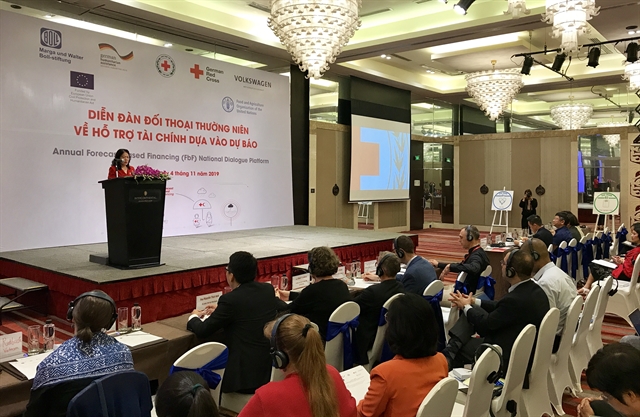 Society
Society


|
| VNRC President Nguyễn Thị Xuân Thu speaks at the first National Forecast-based Financing (FbF) Dialogue Platform in Việt Nam on Monday in Hà Nội. . — VNS Photo Thanh Hải |
HÀ NỘI — Disaster prevention and response activities in Việt Nam have focused on preventative support and building safe communities with the application of new approaches using science and technology.
Participants heard that at the first National Forecast-based Financing (FbF) Dialogue Platform in Việt Nam, co-organised by the Việt Nam Red Cross Society (VNRC) and German Red Cross in Việt Nam, held on Monday in Hà Nội.
Speaking at the event, VNRC President Nguyễn Thị Xuân Thu said that Việt Nam is one of the countries most frequently affected by natural disasters and global climate change. Every year, about 300 people die and go missing due to natural disasters, causing economic losses of around 1 to 1.5 per cent of the country’s GDP.
“The FbF approach aims to optimise the application of technology, data and weather forecast information from the global network into actions and early response before disasters occur to protect lives, assets and livelihoods of vulnerable groups,” said President Thu.
Thu added that FbF was an effective approach to improving the resilience of the community to natural disasters, while also promoting cooperation among scientists, national governments, research institutes and the private sector in improving the effectiveness of forecasting, preparedness and response to increasing natural disaster risks.
Since 2017, VNRC has applied a new FbF approach by implementing a pilot project on early response to heat waves in Hà Nội and Đà Nẵng and developing an action plan on financial support based on forecasts and supporting 21 provinces and cities to develop a forecast map of the impact of natural disasters.
“Expanding needs, competing priorities and scarce financial resources globally mean that new tools are needed to ensure smart, effective investments to help attenuate the impact of disasters before they occur,” said FAO Representative in Việt Nam Albert T. Lieberg at the event.
Lieberg suggested that the Vietnam Disaster Management Authority and the Provincial Committee for Natural Disaster Prevention and Control should form the fundamental driving force to move forward FbF implementation.
Development partners, NGOS and international organisations should adopt the forecast-based financing approach in their strategies and programmes.
“Households must be well aware of the necessary actions to take for mitigating the anticipated impact of disasters. Therefore, stronger coordination and collaboration between the Việt Nam Disaster Management Authority and the National Centre for Hydro-Meteorological Forecasting are key to providing actionable early warnings with reliable prediction of likely impacts and recommended early actions,” said Lieberg.
The FAO representative also highlighted the role of social assistance as important to establishing effective targeting and delivery mechanisms for disaster preparedness and response, including forecast-based financing.
“Mass organisations like the Red Cross, Women's Union, Farmers' Union and others, play a vital role in disaster preparedness and response. With networks at the community level, they are well-positioned to support the formulation of early actions, disseminate actionable early warning messages and identify vulnerable groups,” he said.
This year, the forum aims to gather and establish a network of agencies, departments, experts, scientists and gain a common understanding of how FbF can contribute to the Government's efforts to improve community resilience to natural disasters. It also provides opportunities for participants to share and exchange experiences on FbF among domestic and international agencies and organisations and develop a roadmap towards the institutionalisation of the FbF approach in Việt Nam. — VNS




